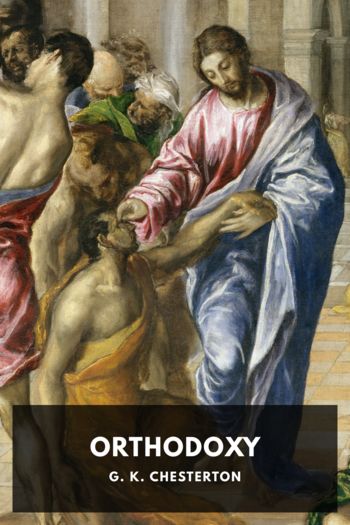Orthodoxy - G. K. Chesterton (literature books to read .txt) 📗

- Author: G. K. Chesterton
Book online «Orthodoxy - G. K. Chesterton (literature books to read .txt) 📗». Author G. K. Chesterton
Again, the same is true of that difficult matter of the danger of the soul, which has unsettled so many just minds. To hope for all souls is imperative; and it is quite tenable that their salvation is inevitable. It is tenable, but it is not specially favourable to activity or progress. Our fighting and creative society ought rather to insist on the danger of everybody, on the fact that every man is hanging by a thread or clinging to a precipice. To say that all will be well anyhow is a comprehensible remark: but it cannot be called the blast of a trumpet. Europe ought rather to emphasise possible perdition; and Europe always has emphasised it. Here its highest religion is at one with all its cheapest romances. To the Buddhist or the eastern fatalist existence is a science or a plan, which must end up in a certain way. But to a Christian existence is a story, which may end up in any way. In a thrilling novel (that purely Christian product) the hero is not eaten by cannibals; but it is essential to the existence of the thrill that he might be eaten by cannibals. The hero must (so to speak) be an eatable hero. So Christian morals have always said to the man, not that he would lose his soul, but that he must take care that he didn’t. In Christian morals, in short, it is wicked to call a man “damned”: but it is strictly religious and philosophic to call him damnable.
All Christianity concentrates on the man at the crossroads. The vast and shallow philosophies, the huge syntheses of humbug, all talk about ages and evolution and ultimate developments. The true philosophy is concerned with the instant. Will a man take this road or that?—that is the only thing to think about, if you enjoy thinking. The eons are easy enough to think about, anyone can think about them. The instant is really awful: and it is because our religion has intensely felt the instant, that it has in literature dealt much with battle and in theology dealt much with hell. It is full of danger like a boy’s book: it is at an immortal crisis. There is a great deal of real similarity between popular fiction and the religion of the western people. If you say that popular fiction is vulgar and tawdry, you only say what the dreary and well-informed say also about the images in the Catholic churches. Life (according to the faith) is very like a serial story in a magazine: life ends with the promise (or menace) “to be continued in our next.” Also, with a noble vulgarity, life imitates the serial and leaves off at the exciting moment. For death is distinctly an exciting moment.
But the point is that a story is exciting because it has in it so strong an element of will, of what theology calls free-will. You cannot finish a sum how you like. But you can finish a story how you like. When somebody discovered the Differential Calculus there was only one Differential Calculus he could discover. But when Shakespeare killed Romeo he might have married him to Juliet’s old nurse if he had felt inclined. And Christendom has excelled in the narrative romance exactly because it has insisted on the theological free-will. It is a large matter and too much to one side of the road to be discussed adequately here; but this is the real objection to that torrent of modern talk about treating crime as disease, about making a prison merely a hygienic environment like a hospital, of healing sin by slow scientific methods. The fallacy of the whole thing is that evil is a matter of active choice, whereas disease is not. If you say that you are going to cure a profligate as you cure an asthmatic, my cheap and obvious answer is, “Produce the people who want to be asthmatics as many people want to be profligates.” A man may lie still and be cured of a malady. But he must not lie still if he wants to be cured of a sin; on the contrary, he must get up and jump about violently. The whole point indeed is perfectly expressed in the very word which we use for a man in hospital; “patient” is in the passive mood; “sinner” is in the active. If a man is to be saved from influenza, he may be a patient. But if he is to be saved from forging, he must be not a patient but an impatient. He must be personally impatient with forgery. All moral reform must start in the active not the





Comments (0)